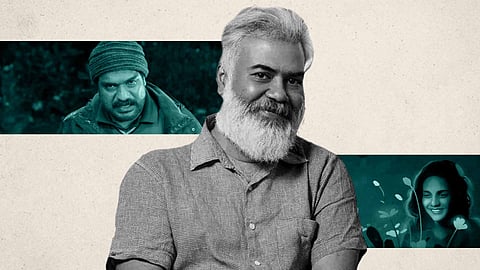
- Reviews
- Power List 2024
- Cannes 2024
- In-Depth Stories
- Web Stories
- News
- FC Lists
- Interviews
- Features
- FC SpecialsFC Specials

Ranjan Pramod, the writer of consecutive superhits Meesa Madhavan (2002), Manassinakkare (2003) and Naran (2005), is back to the director’s chair after five years. As someone who works only on one film at a time, the writer-director says that a new film begins only based on the requirement of time. This means that apart from his first directorial Photographer (2006), which was his “response as a member of the fraternity against the violence that affected the tribal community,” most of his films began at a project stage. “The idea for Randam Bhavam (2001) came from a situation in which we had the dates of a star like Suresh Gopi and a director like Lal Jose. O.Baby, in that sense, is a film that got designed after it was decided that I will make a film with Dileesh Pothan in the lead. He then joined as a producer too.”
Malayalam film O.Baby, which will be released this Friday, does not have too many familiar faces except for Pothan, an actor with whom he has worked in his previous film Rakshadhikari Baiju Oppu (2017). For Pramod, what started out as a successful career as a star screenwriter transformed into that of a director with the Mohanlal-starrer Photographer. Not that even the decision to become a screenwriter was planned, admits Pramod. “I studied to become an editor at the Adyar Film Institute, back in the 90s, but screenwriting was almost an accidental profession. I was to debut with a film I wanted to direct with Ajith in the lead. It was produced by Henry, who made classics like Yavanika (1982). This was before Ajith made Vaalee (1999) and at that time, there was a major union issue, which finally led to the formation of two different workers’ bodies. That was why I couldn’t go ahead with my first film. It was called…Mazha Vara Poguthey.”
The stalling of his first film made him change tracks into ad-filmmaking. Back when the Ajith film was on track, he had even marked the talented Lal Jose as the associate director for it. That association led to a friendship that would later result in the cult classic Randam Bhavam, followed by the blockbuster Meesa Madhavan. “Not many will believe it today but I remember how disappointed both Lal Jose and Dileep were after watching the first copy of Meesa Madhavan. The film’s editor told both of them that the film would have been much better if it had actually had a “story”. Later, when the film worked, most of them understood what I was trying with the writing. In my perspective, the audience does not need a story nor does the director. As a writer, we need to make sure we hook the viewer from start to finish but they do not really need a story for that. It is the writer that requires a story. If you ask me, the story is just a tool that holds the film together. It is like the thread that binds a book that makes sure the pages don’t go missing. It should almost be invisible.”
This comes from his personal belief that every new film must pique his experimental interests in some way. “It’s not that my films should be the first of its kind in the world of cinema. But it should be the first of its kind among the films I am working on. That’s the only way I can stay invested in it.”
It is in this zone that he points out how there is neither conflict nor resolution in his film Rakshadikari Baiju Oppu. As a story, it’s something that would not make sense to anyone. It is a film you need to see as a final product to get what the initial idea was. Meesa Madhavan too was equally experimental, but the experimental nature should not be obvious because I do not make films for the elite who watch them in European film festivals. Commercial success is important to me,” he says, stating how O.Baby too will be a marriage of art and commerce.